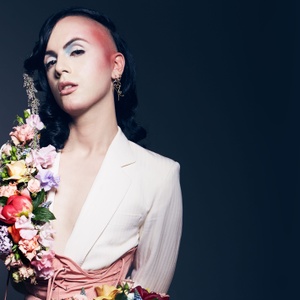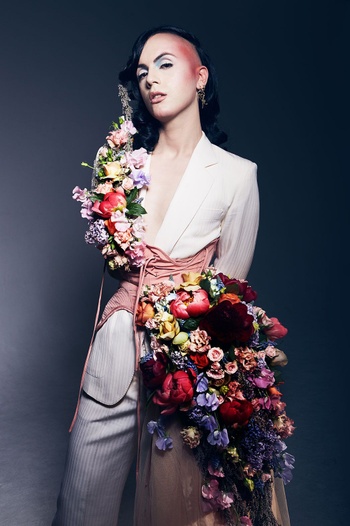Performer and singer Juriji Der Klee does not shy away from ambiguity. He fluctuates between masculinity and femininity, classical music and pop. His cabaret Benediction is likewise difficult to categorize. So it fits in perfectly with the celebration of diversity that is the Pride Festival.
© Guillaume Kayacan
Also read: Pride: confetti and culture
Who is Juriji Der Klee?
- Born in Madrid in 1990. Moved to Brussels when he was three years old, where he lived in a house with his parents, brother and sister, uncle and aunt, and grandfather. “Very Almodóvarian,” he jokes.
- First performed in drag in 2009, after taking his first singing lessons. The location: the queer party Dansez-vous français?
- In 2012, when he was 21, he left the conservatory in Brussels. “Too conservative,” he says. He wanted to find his own voice.
- Released his first EP in 2013: Broken.
- In October 2017, after years of planning, his cabaret Benediction premièred at bar Benelux.
- In September 2018, he will perform in the theatre play Here She Lies, Sir by Mario Leko.
His long braid waves in the wind and one big golden earring hangs from his right ear. His black clothes cling to his body, and his face has some subtle touches of make-up. He’s holding a beret and smiling as he cycles up to the Fontainas café, on the Kolenmarkt/rue du Marché au Charbon in the centre of Brussels. For the Spanish-Belgian singer-performer and genderbending artist Juriji Der Klee (27), the café is a safe space. It is one of his queer anchors in the city.
But there are others, like the Benelux café that stands in the shadow of the Broodhuis/Maison du Roi and the Grote Markt/Grand Place. Der Klee lives around the corner and is a regular customer. That is where, in October 2017, he premièred Benediction, a monthly cabaret that pokes fun at everything that is normative and normal. “It is not just a cabaret, a drag show, striptease, or burlesque. Benediction is a monthly queer ritual that is performed on stage by a group of fifteen people,” he says. Queer means politics, activism, and militancy.
“Perhaps we’re not as militant as I would like us to be in Brussels, my impression is that we prefer to be entertained,” he says. “Our cabaret aims to combine activism and entertainment. If a woman who does not look like the norm wants to dance, we celebrate that on the stage. That act in itself is militant. But it is also entertaining. I recently saw an interview with the filmmaker John Waters. He talked about RuPaul’s Drag Race (a reality TV show about drag queens who compete for a big cash prize, td). He said he thought it was brilliant because it combines activism, drag, playing with gender, and light entertainment all in one. It is an intelligent way to introduce people to a certain perspective. It’s much cleverer than aggressive militancy.”

© Guillaume Kayacan
| Juriji Der Klee, the boy who wanted to sing Carmen
Almodóvar Brussels style
During the Pride Festival, the two cultural weeks organized by the RainbowHouse around the Pride on 19 May, Brussels will celebrate all things related to LGBTs and gender expression. There are debates, lectures, film screenings, workshops, and performances. Der Klee and his group of performers are also on the programme. Der Klee’s collective Benediction will first present a joint hymn following an evening debate about drag at La Bellone. On the following evening, the collective will perform their full act at the Benelux. “Like every month, we will perform a special ritual. This time, we are focusing on witchcraft and organizing a sabbath. But don’t expect Halloween,” he laughs. “Witches have always challenged power. They were genuine feminists. That suits me perfectly.”
Fans describe Juriji Der Klee as a cross between the German new wave star Nina Hagen and Klaus Nomi, who was likewise German and who was one of the first singers to combine opera, pop, and vaudeville in one act. “Yes, I am most often compared to Klaus Nomi,” he says. “But my sources of inspiration are very varied. I have always been attracted to surrealist poetry, for example, but also to Chet Baker, Magritte, Hitchcock. And Almodóvar of course. That’s probably my dramatic Spanish side,” he laughs.
“Now that I think about it, I have always wanted to perform on stage,” he says. Der Klee grew up in a crowded house in the centre of Brussels. He was born in Spain, but his parents soon moved to Belgium. His parents, his brother and sister, his uncle and aunt, and his grandparents all lived under the same roof. In other words, Almodóvar Brussels style. “It was sometimes pretty wild, so it’s no surprise that I have a very developed sense of drama,” he laughs.
It is a great shame that the gay world in Brussels has become so heteronormative. It is as though we’re no longer proud of our difference and diversity

Combining two extremes. It is something at which Der Klee excels. He is neither a man nor a woman. “Those words don’t interest me, they don’t define me, I have my own gender,” he says on that subject. More even, it is in his genes. “I am actually a queer militant by just existing. I have two genetic codes. My mother was pregnant with twins, but I devoured my sister in the womb. There are still parts of her in me. I have three kidneys, for example. So literally, I am neither a man nor a woman.” He is also neither a classic singer nor a classic drag performer. He’s neither Belgian nor Spanish. “Living between two worlds is not easy,” he says. “And it was especially difficult when I started working as an artist a few years ago. But I have learned a lot. I’ve flicked a switch in my head, and I don’t let anyone mess with me anymore.”
Freaky family
Der Klee is a classically trained countertenor, but he didn’t fit in at the strict conservatory in Brussels. “A countertenor has a similar vocal timbre to a mezzo-soprano. For the stringent Christmas exams at the conservatory, I wanted to sing an aria from Carmen. My teacher forbade it. He thought it was improper that a boy would sing that aria. It’s ridiculous of course,” Der Klee says. He laughs, shakes his head, and shrugs his shoulders. It was not the first time that he encountered prejudice and entrenched principles. “Those remarks hurt me very badly. I packed my things and left. Perhaps I should have stayed, but I wasn’t mature enough. So I decided to start experimenting with music by myself.”

© Guillaume Kayacan
About the photo shoot
Photo: Guillaume Kayacan
Styling : Vanessa Pinto
Clothes : Chloé
Earrings : Camille Pennequin
Flowers : Monade Flowers
Makeup & hair : Bixento
If his experience in the music world has its ups and downs, he took to the world of drag performance like a duck to water. In 2011, he joined the Bas Nylon collective with the gender performer and drag queen Jean-Biche, who has since moved to Paris. The alternative cabaret evening started at the drag institution Chez Maman, a stone’s throw from café Fontainas. “The tension between our strange performances and classical drag was very exciting. When Jean-Biche moved to Paris, I wanted to keep our ideas alive. I have rediscovered the freaky family I had then with Benediction.”
In addition to Chez Maman, where hundreds of fans come every weekend to gaze open-mouthed at lip-synching drag queens, there is also La Boule Rouge and Cabaret Mademoiselle. But Der Klee didn’t really find a home at either of those places. “Don’t get me wrong, those places are amazing, and I love them. But they present a very binary form of drag. They are men who dress as women. We have a much broader interpretation of drag. Post-gender, if you will. That is our project and that is our style.”
The performers in the collective have long abandoned the classical idea of what a man ought to be or how a woman ought to behave. Women dress as men, men wear women’s make-up. The performers who do not go by a single pronoun or gender create their own identities. The body is an important medium for the collective. “Take a woman’s body, for example. A few editions ago, we had a woman stripping in a burlesque act even though she did not have the traditionally appropriate body for it. We celebrate that on the stage. A performance like that is a militant project as such,” Der Klee says. “I am very happy that we’ve found each other. I love working with my freaky family.”
“In Madrid there is a huge gay neighbourhood called Chueca. Here we have one street. Queer life does exist here, it is just on a small scale. It’s fun because everyone gets along really well. But I did get a bit bored of it after a while. Especially the nightlife. All the parties are the same, all the people look the same. It is a great shame that the gay world has become so heteronormative. It is as though we’re no longer proud of our difference and diversity. Can’t people just be themselves? If you are flamboyant, just be flamboyant. You don’t have to dress like a straight person just to feel safe. I dream of a more inclusive world where everyone is welcome. I want a more generous world. And I hope that Benediction is making a contribution to that.”
Der Klee pauses for a moment, straightens his back, and runs a hand through his long hair. He looks outside, searching for the right words. “Very early on, I was made conscious of the fact that my presence provokes strong reactions,” he says, continuing to look outside. “Especially here in Brussels, it is difficult to be yourself. People spit at me, laugh at me, point, follow me down the street. And not just me.”
He refers to a recent homophobic attack in the centre of Brussels that shocked the LGBT community. “It makes me angry and sad. Personally, I have had enough. More than ever, I think we should be ourselves now. I dress and behave the way I want to. I understand that I can’t wear 15-centimetre heels anywhere I go, but on stage I can because I am safe there.”
> Pride festival. > 20/5, various locations
> Out and home – codes de travestissement. 12/5, 17.00, La Bellone
> Rituels Exceptionnels – Le Sabbat des Sorcières. 13/5, 19.00, Benelux
Read more about: Brussel , Events & Festivals , Pride




Fijn dat je wil reageren. Wie reageert, gaat akkoord met onze huisregels. Hoe reageren via Disqus? Een woordje uitleg.